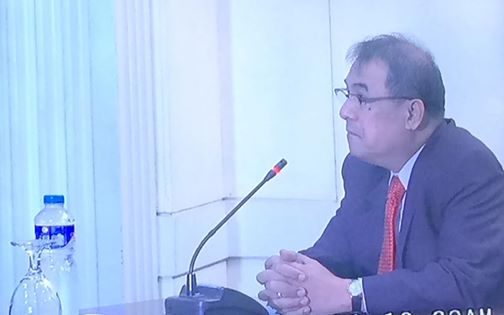SUMMARY
This is AI generated summarization, which may have errors. For context, always refer to the full article.

MANILA, Philippines – Sandiganbayan Associate Justice Alexander Gesmundo on Tuesday, July 4, said there should be revisions in the rules of court that will expedite processes and give Filipinos faster justice.
Gesmundo is part of a special committee which already submitted a recommendation to the Supreme Court (SC) to start amended rules by September. He was interviewed on Tuesday by the Judicial and Bar Council (JBC) which is screening candidates for President Rodrigo Duterte’s 4th appointee to the SC.
One of the recommendations, Gesmundo said, is to prohibit defendants from filing a motion for determination of probable cause. Under the rules of court, this is allowed at the start of proceedings when an information is filed before court.
This prolongs the process to at least 30 days. For Gesmundo, the court is already duty-bound to determine probable cause without the need for a motion.
“If (the judge) finds a need to require additional evidence from prosecution, he can ask for additional evidence. Now, if there is that motion for determination of probable cause, it should no longer be allowed because it is the duty of the court to issue a warrant of arrest on probable cause, that at least will save 30 days,” Gesmundo said.
Gesmundo added that initiatory pleadings in civil cases should already include evidence. Under the rules of court, only facts of the case are required to be established at the start of the proceedings; only during pre-trial are parties required to start submitting evidence.
“In my view, (to have the) earliest possible time for the court to have access to evidence would be expediting the process so when it reaches pre-trial, the court already has an idea of the course of action,” Gesmundo said.
Inordinate delay
Gesmundo is the chair of the anti-graft court’s 7th division. He was asked on Tuesday why the Sandiganbayan only manages to dispose of two cases a month, given its caseload of 586.
“The situation at Sandiganbayan is that cases take a while to be tried owing to the complexity such as for example the number of cases filed and the number of accused,” Gesmundo said.
Gesmundo, upon the question of a JBC member, admitted that the court can also cause delays in proceedings. This admission comes amid a conflict between the Sandiganbayan and the Office of the Ombudsman on the issue of inordinate delay.
The Sandiganbayan has dismissed 79 cases from January 2016 because of investigative delays at the Ombudsman level. Ombudsman Conchita Carpio Morales, in turn, filed a case before the SC asking it to order the anti-graft court to temporarily stop using the inordinate delay principle in resolving cases.
Morales is asking the SC to review or totally strike down the doctrine of inordinate delay. (READ: Ombudsman asks SC to strike down ‘delay’ doctrine)
Gesmundo explained that the delay at their level is mostly due to two things, first is the difficulty of bringing in witnesses to the court in Quezon City when most of them come from provinces, and second is the differing legal strategies of a defendant’s set of lawyers.
At the anti-graft court, public officials usually have more than one corruption case; sometimes it’s different cases stemming from one issue, or different issues altogether. They have different lawyers handling different cases, and sometimes they change lawyers in the middle of trial which opens up an opportunity to try a different legal route, thus prolonging the process.
Gesmundo said he supports judicial reforms where judges and justices are given a more proactive role, such as controlling the calendar of hearings, and restricting postponements and cancelations.
“Courts have been passive, this I learned while I was part of a study group in the US, and there we learned that active role of a judge is important, he should control the calendar of the case, not the litigants. One judge there even said that the only excuse she will accept (to postpone hearings) is when the lawyer is dead,” Gesmundo said. – Rappler.com
Add a comment
How does this make you feel?
There are no comments yet. Add your comment to start the conversation.